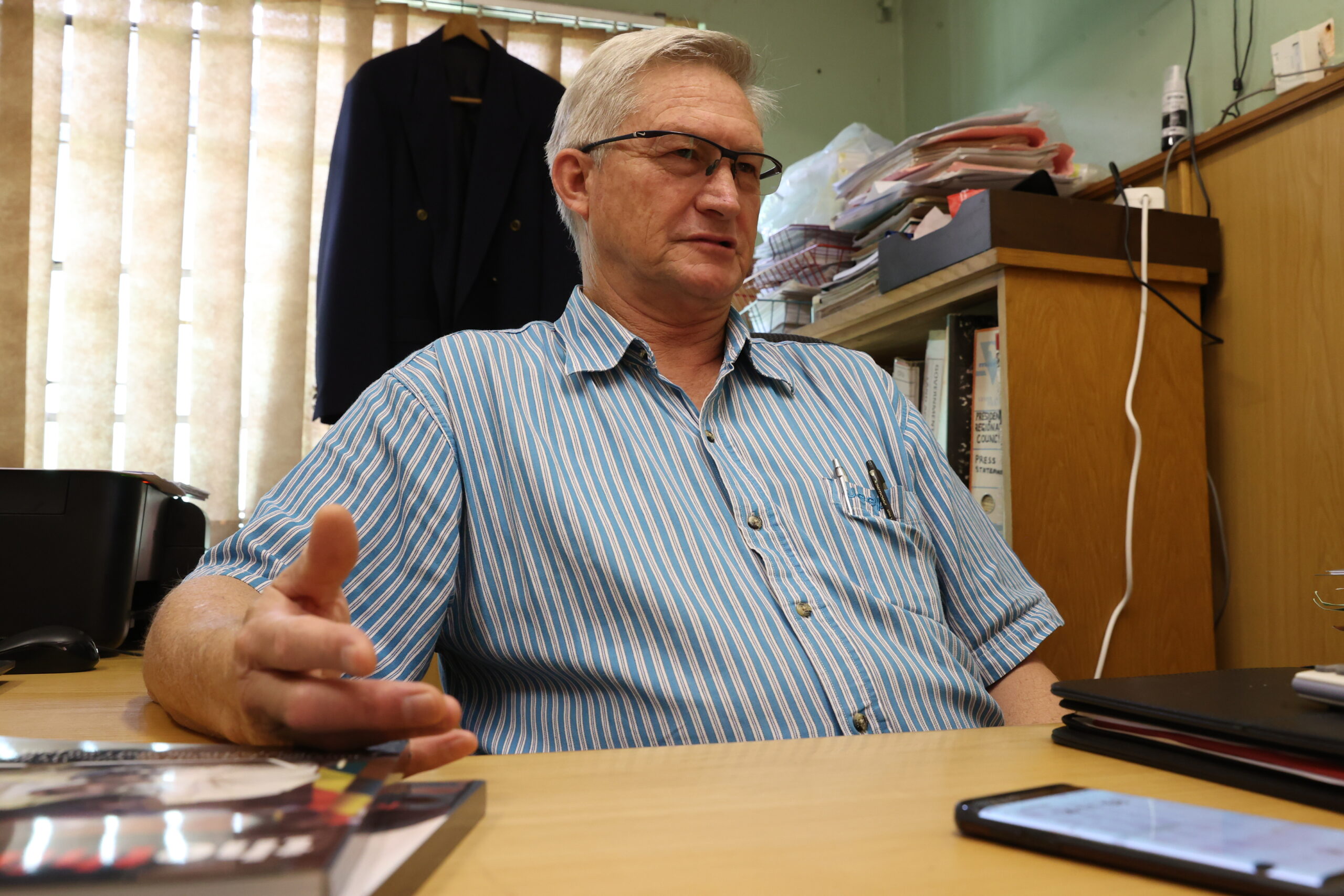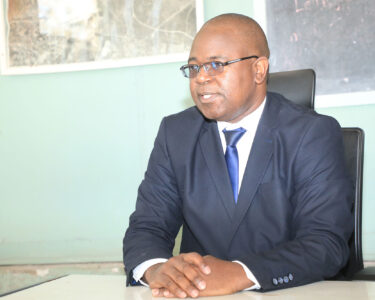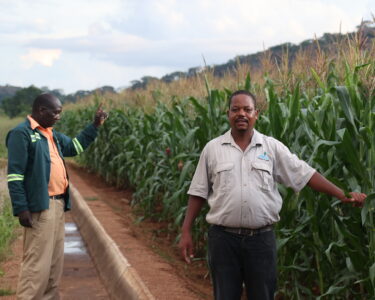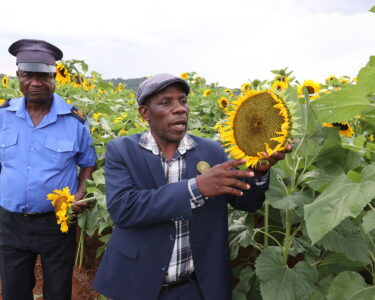‘We learnt very hard, and so we’re working closely with government’
Since the government embarked on the historic land reform programme in 2000, the Commercial Farmers’ Union (CFU), which represents the interests of white commercial farmers, the two have been on a collision course. In fact, relations had soured to a point where the two could not even meet face-to-face. However, it looks like over the past few years, the two camps are slowly finding each other. In this Q&A with our Editor-in-Chief, Munyaradzi Huni, the CFU chief executive, Sam Miller, admits that some white commercial farmers lost the plot (pun not intended) at the onset of the land reform programme by adopting an adversarial stance. But, says Miller, the CFU has turned over a new leaf and its days of fighting the government are over now. Read on . . .
Q: Can you briefly tell us about the current state of affairs at the CFU?
A: The current state affairs is that we are quite stressed from a farming perspective by virtue of the fact that all of our commercial farmers, or at least the majority of them, are self-funded. Self-funding in an environment without any form of collateral security has made it very difficult for our members to develop. But having said that, our members have been very resourceful under the guidance of Minister Masuka. We have gone a long way in producing Zimbabwe’s crop requirements.
We have hit a wall in the sense that we are still in an environment where payments are slow. We understand the economic situation within Zimbabwe and we are working closely with the Ministry of Finance as well as Ministry of Agriculture to address this issue . . .
What we are struggling with now is the Zimbabwe dollar portions we were paid. The Ministry of Finance, the banks and GMB did well in getting the Zimbabwe dollars paid as quickly as possible. The problem is that money was spent very quickly because the interest rates were just too exorbitant, plus or minus 200% last year. It has since gone down and we are at 100% now. I don’t know of anybody who will take out a loan at 100% interest, but this is what we are having to do right now.
I know the ministries of Finance and Agriculture are doing their best to bring the interest rates under control, which is a welcome move. Our biggest problem, however, is that we don’t have any collateral security to facilitate growth for development.
Q: How and why is it that you don’t have collateral security?
A: Under normal circumstances, title deeds are used as collateral to get loans from banks. We don’t have title deeds at the moment; we don’t have 99-year leases either. We are aware, however, that government is working tirelessly to get that right.
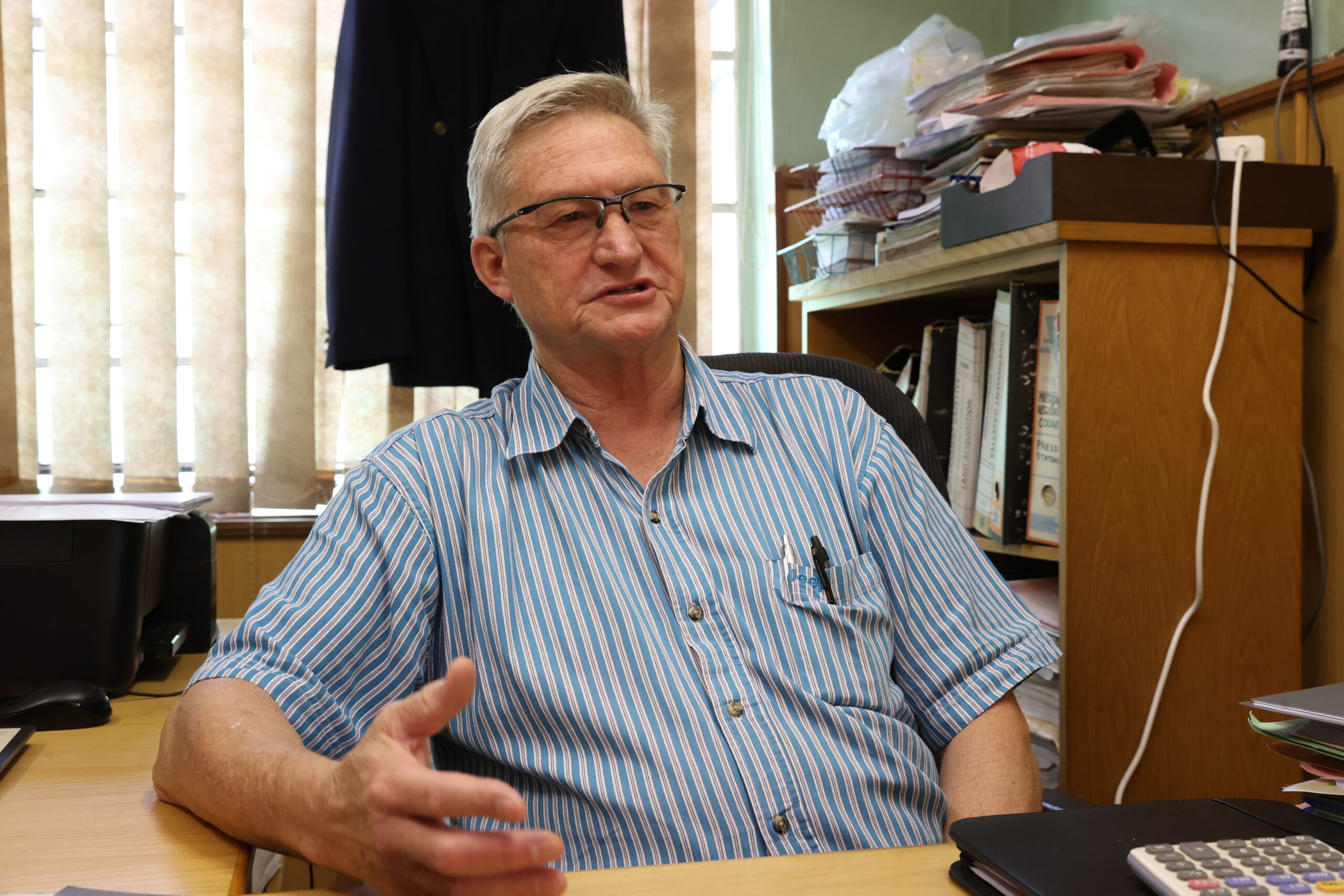
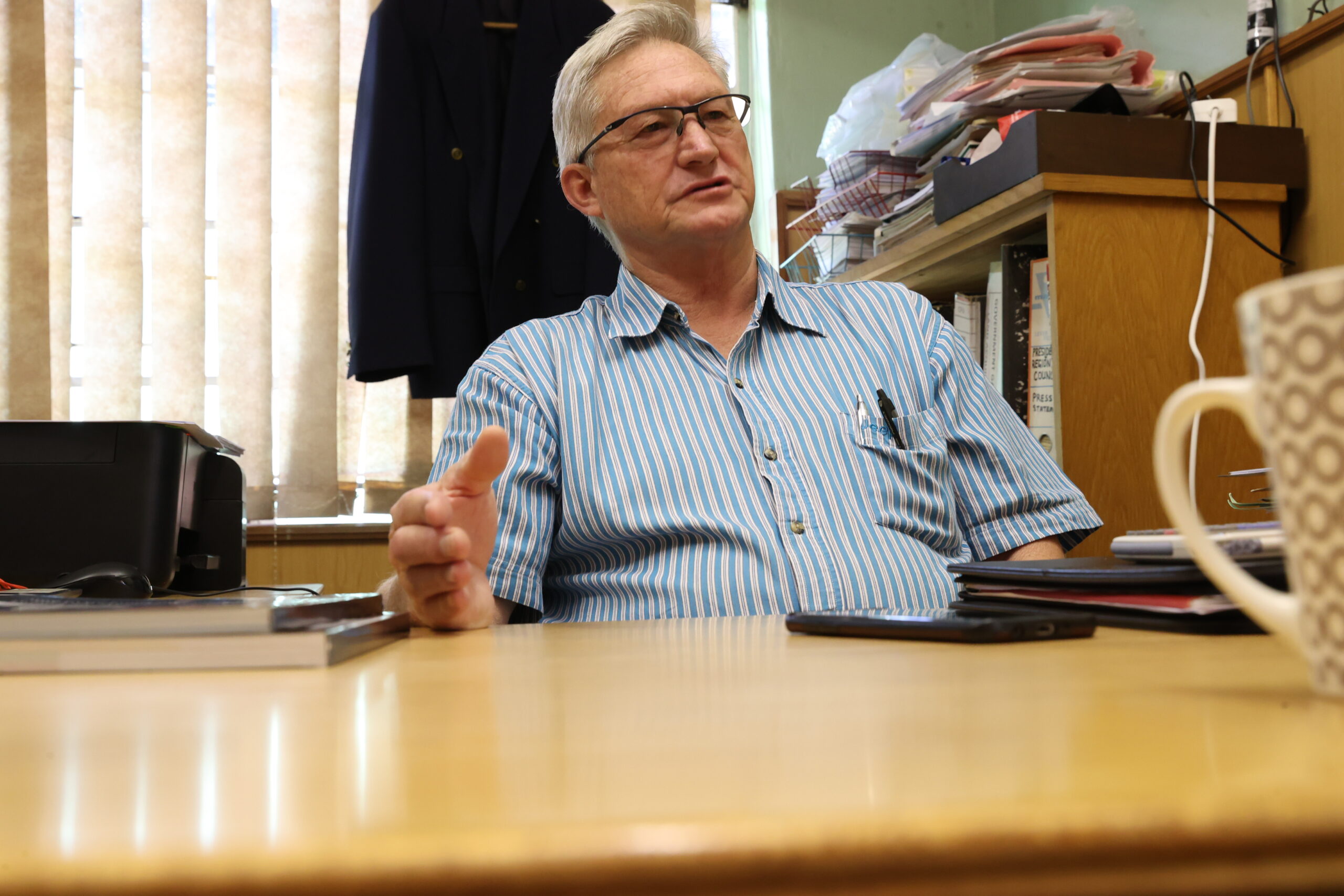 So our biggest problem is that we need to get to a point where we have some form of collateral to help us get finance from the banks to grow. What is happening now is that our members are using their personal finances or personal loans to develop. Some are succeeding, others are not. If you take this issue into account, when we went into the summer crop, farmers had not been paid for the winter crop, leading to a bottleneck in the free flow of cash.
So our biggest problem is that we need to get to a point where we have some form of collateral to help us get finance from the banks to grow. What is happening now is that our members are using their personal finances or personal loans to develop. Some are succeeding, others are not. If you take this issue into account, when we went into the summer crop, farmers had not been paid for the winter crop, leading to a bottleneck in the free flow of cash.
As I have said, the Zimbabwe dollar component was paid on time. Unfortunately, the nostro component was very, very slow. That, we understand, is being pursued at the moment by the Ministry of Finance to get Treasury to release the money to the GMB so it is in a position to pay our farmers.
Q: This is payment for what, by the way?
A: For the winter crop. You have got to understand that because of the dual currency, all the suppliers want US dollars. In fact, even the vendor on the street wants US dollars and it makes sense because he/she can retain value. When the farmer gets paid in RTGS [Real Time Gross Settlement], he has to spend it as quickly as he can because it loses value so fast. This is why people [and businesses] prefer to use US dollars.
The unfortunate thing is that we are not in a position to do that at the moment. What is actually happening is that the cost of the money becomes very expensive. As it stands, the farmers’ margins have been eroded significantly by the additional cost. We also have other ancillary costs, such as Zinwa for water, Zesa for power and so on. There is very little dispensation for farmers.
Q: I want to put this interview into its proper historical context. Can you tell us how the CFU and its members were affected by the land reform programme?
A: Obviously, the CFU and its members were adversely affected because the majority of the commercial farmers in the country were under CFU. We had some black members, but whites where in the majority. When the farms were taken, it’s like a business, someone comes and takes your business and pulls out the plug and says “Ok, carry on”. This is what technically happened. People were taken off their farms, but they still had debts to pay to the banks as well as pay wages to the workers.
What actually happened is that we placed a heavy burden on the farmers to the point where if you take the first 20 years of independence, no one would talk to the commercial farmers. I think we were actually called enemies of the State in the beginning. We were said to be against what government was doing, which is not strictly true when you get to understand what the procedure was about, what was going on.
We do understand the land issue, but we also need to understand that you can’t just go to a company and pull the plug. We should have come up with a better method.
Q: But the process and method was quite clear from 1980 until the land reform programme started in earnest around 2000. Don’t you think it’s the white commercial farmers who failed to play their part? It looks like they were not taking the issue very seriously?
A: Well, yes and no. The fundamental thing was that if we go back to the beginning, as far as I am aware, it was on a willing buyer-willing seller basis. After that the process went to compulsory acquisition. The problem is, if you also remember, there was some agreement with the British on how they were going to pay. Or at least assist.
The British came on board and the Zimbabwe government didn’t at the time. So that is where the process fell apart. And then, obviously, I think around 1997 (1999 actually), there was this big polarisation that happened — a whole lot of nonsense took place.
Q: What do you mean “nonsense that took place”?
A: The farmers were just to blame as everyone else with their attitude.
Q: When you say the British came to the table and the government didn’t, what exactly do you mean?
A: Well, they didn’t pay their half. That is the information I have.
Q: Are you sure that information is correct?
A: I don’t have all the history, but that is the information I have, whether right or not. So, it may not be correct, but that is what I am aware of. Fundamentally, after the referendum and the polarisation there was quite a lot of violent takeover of the farms. We understand also the emotions involved in that kind of situation. The important thing, though, is that when I look at the farms now, like around 2017 when Honourable (His Excellency) Mnangagwa became the President, they started talking to us again. We understood the need to get agriculture back on track.
Remember, if you look at the original laws of Zimbabwe written by Cecil John Rhodes, he was a miner, so they were favouring mines as opposed to farmers. We are an agrarian-based country and we were good. We were very good and we were developing. We are trying to build that back now.
Q: When you look back at the land reform programme, do you think it was a noble idea for the government to embark on that exercise?
A: What was noble was the fact that Zimbabweans needed to understand the issue. It didn’t matter what colour they were. At the end of the day, the land issue had to be resolved. We are not denying that at all. It needed to be done in an amicable way and it needed to be funded.
Remember those farmers that we are talking about, there were generational farmers or they had acquired their farms. A large majority of the farms were bought and sold after independence. So then to take them again was where the problems arose. Don’t forget, farming is like any other business. Not everybody can be an MD [Managing Director]. Some people are workers, some are managers and others are MDs.
Farming is no different. The problem is that farming is one of those industries which I find very curious by virtue of the fact that it’s not a case of just going to school and getting a degree in agriculture. That doesn’t make you a good farmer. It has got to be in your blood. There are a lot of farmers out there of all nationalities, all colours and creeds that are fantastic farmers.
I was assisted by a gentleman called Cephas (can’t remember his surname). He used to help me on my farm when I first got it. He was a fantastic man. I can’t find him now. I wish I could.
Q: When you reflect now, let’s say you were the government, what would you have done differently to address the land reform issue?
A: I would have said Ok, here is compulsory acquisition, come up with a rational model on how you are going to pay the farmer for his farm. Understand that the farm is the land and the improvements. We need to understand that. The farmer was inputting into the land as well as making improvements to facilitate the growth of his crops. There should have been an agreement, however it was done, a legal agreement where government sat down with the unions or with the farmers and said this is what we are going to do. This is your decision and this is how we are going to pay. That didn’t seem to take place until after the fact. So farmers were left destitute.
Q: Don’t you think that the attitude of the white farmers against the land reform programme prompted the government to act the way it did?
A: Absolutely! Absolutely! The arrogance of some of the farmers was wrong. I say this openly by virtue of the fact that you know what, we had this attitude that this was mine and, yes, according to the law it was mine. The truth is that attitude was totally wrong and somehow that had to be addressed.
If you look over time, I have the privilege of dealing with some white farmers now, they would have been so good for Zimbabwe as we are today. They have trained, encouraged and nurtured a lot of black farmers on the land to grow properly. I have been to field days where I am in absolute awe at the quality that we are seeing. That, to me, is what we should be doing. We should be handing over to our children. These young guys that are coming up now have the skills. I am not saying all of them can manage or run a farm. But they can farm. That is the first step. Eventually, the guy will be able to manage the farm and run it. That is what we need to build on, although this process may take some time.
The big issue is that in farming, that whole cash flow process is important like in any business. It’s the critical component that makes or breaks a business.
Q: We saw some white farmers openly donating money to the Movement for Democratic Change (MDC) when it was formed in 1999. Don’t you think that fuelled the fire?
A: That is the arrogance I am talking about. The CFU has since taken a very strong stand. We are apolitical. I am not a politician. Why should I be involved in politics? We do not take sides. We are only here purely for agriculture and to develop the farming community. That community is across the board. Anyone who is commercial, we will deal with them.
Q: Do you think your members agree with this position you are talking about?
A: Yes. There are some who don’t, but there are more who do. Like I am saying, I am meeting more and more of them now. These are guys my age. These are the guys who went through all the hard times. Some of their stories are very tragic, but what is important is that they are now training and working with the new farmers. One of our fundamental exercises is going to be the setting up training programmes where we are going to use the expertise of a lot of these farmers to train young and upcoming farmers.
Q: These young and upcoming guys, are you talking about black farmers here?
A: Close to. It’s close to by virtue of the fact that what we are trying to do, first, is obviously, as we speak now, for a farmer to go and use the land he has to have an offer letter. He gets an offer letter or he creates a JV (joint venture) with someone who has an offer letter. In doing that he grows and develops the land. He has to pay the current farmer with the offer letter and has to pay others. So it has become a little bit restrictive. What we are hoping to do is that once we can get this whole issue of offer letters sorted out and people can apply for them, is to create an environment where those offer letters will be given to guys that are going to develop, utilise and return back to the country a good crop.
Q: From another angle, do you think Britain and its allies played a constructive role or they made the situation worse for the white farmers by making them think they could resist the land reform programme?
A: I don’t know what role they played, to be honest with you.
Q: You remember that letter by Clare Short in which Britain repudiated its obligation to compensate the white commercial farmers? Don’t you think they fuelled the problems?
A: Yes and no, because when my farm was taken, I got a letter from the British Ambassador at the time basically saying this is unjust and unfair, but we can’t do anything about it. That is the only assistance I ever got. So I got nothing from the British. I got nothing from anybody. I have had The Hague interviewing me a couple of times way back then. The bottom line is we got no help from anybody.
Q: But when the British Ambassador wrote to you saying this was unjust and unfair, don’t you think they were instigating you to take a tough stance against land reform?
A: Yes, they did, but I didn’t. Personally, I did not take sides. I decided, right from the beginning when my farm was acquired, that I was not going to hold any grudges and I haven’t. I said, at some stage, there would be some legal issues that have to be resolved like in the rest of Africa, Kenya and Uganda, for example. That is the process we are in now. The important thing there is that I find Honourable Minister Masuka, the Vice President and the President, all have a desire to get this thing resolved. That is a positive for us and the CFU has taken note of that. We have a very close relationship with the Ministry of Lands. I have got a lot of respect for the director there. They are all very nice people.
Q: The President, Vice President and the Minister may be keen to sort things out with the CFU, but are your members reciprocating this gesture by the Second Republic?
A: Yes, they are reciprocating. A lot of our members are. Look, it’s like any organisation, you got some very old farmer who is still bitter and all he wants is compensation. We understand that. However, the majority of the guys are born and bred farmers. They are generational farmers. They were born into this game and they are very, very good. They are still farming. They are farming in conjunction with A2 farmers and others. They are doing a great job. If you look at the majority of the crop that is actually being grown, it’s being grown by self-funded farmers. These are private people. Individual people. That is a good thing.
The important thing is that we should get to an environment where farming goes back to the natural business using the willing buyer-willing seller approach so that we can maximise our returns while ensuring that we bring down our input costs.
Q: How big is your membership now?
A: Our membership has actually dwindled to about 1 000 now. It’s actually between 750 and 1 000.
Q: Originally, you were how many?
A: Around 4 000 to 4 500.
Q: How has the number gone down to 1 000?
A: A lot of them migrated while others passed away. Some of the guys gave up farming altogether and so they are no longer CFU members.
Q: Are there some who have migrated and want to come back?
A: Yes, there are [quite a number] actually. Quite a few of them who went to South Africa and overseas but would like to come back and go back into farming again.
Q: On 29 July 2020, the government signed the US$3,5 billion Global Compensation Deed. Do you think this will help to restore relations, trust and cooperation?
A: Yes, I do but here is a caveat to it – the deed was supposed to be consummated in 2021. That was when first half [of the money] was supposed to be paid. Government didn’t have the money and so it wasn’t paid. Then it was extended to 2022 and the same thing happened. The money was not available.
We are currently negotiating with government to come up with a deal which is more palatable or feasible for them and maybe even better for us as farmers because it’s answering a lot of questions. There is a lot of intense work going on as we speak between the Ministry of Finance and ourselves. To be very honest, I am very grateful to Minister [Mthuli| Ncube for the work he is doing. I am always willing to help to resolve the issues.
Nothing has been paid so far. We had what they call an interim payment, which was paid to destitute farmers, i.e. those who lost their farms and have no other source of income. The government has been paying them the money in Zimbabwe dollars.
Let me set the record straight here. That agreement wasn’t US$3,5 billion originally. It was US$5,2 billion. Government said Ok, if we pay you early, will you take a bit of a cut? We went back to our members with the offer. Everyone agreed that if we were going to be paid within a year, US$3,5 billion was fine. Well, that didn’t happen. We know that the government is in a critical position financially.
Q: Now because of these delays, what is the mood among the white commercial farmers?
A: The mood is not very good. You have to understand that most of the farmers who were around 40 years, 50 or 60 in the year 2000 are now around 60, 70 or 80. They are now past their productive years. They want their money before they pass on so that they can have some dignity. This is what we are trying to work on now and come up with a programme that will actually facilitate that to happen.
Q: How many of these former commercial white farmers have registered to be paid?
A: Around 2 600. I don’t know the exact number.
Q: Where are they?
A: Mostly in Australia, but some are dotted across the world.
Q: What criteria are you using to come up with the list of the former commercial white farmers to be paid?
A: All a farmer has to do is register and show us his title deeds so that we know that he/she is the owner of the farm he/she is claiming. We will enter their name into the database after which they will be eligible for payment. One has to prove that he/she owned the farm in question.
Q: Zimbabwe has been put under sanctions by some Western countries mainly due to the land reform exercise. Do you think the sanctions were justified?
A: Well, first of all, the sanctions were not against Zimbabwe. They were specified sanctions. They were imposed against individuals. Did they add value? Not really, but are they protecting people most probably. But do I think the sanctions are actually helping right now? No. I don’t see anything that has changed. The people who were specified are still here and they are still breathing. So I don’t understand what the intention is at the end of the day.
Q: I am a bit surprised that you are saying the sanctions were targeted against certain people. Can’t you see the ordinary people suffering because of the sanctions?
A: Absolutely, but here is the thing. If your father committed murder, should they hang you? However, I can tell you that many people in Zimbabwe are struggling, but Zimbabweans are a resilient lot. They are very resourceful. Everyone is becoming an entrepreneur. Everybody can do something. It may not be good for the country, but it’s good for the individual from the perspective that he has money.
Q: Let me be very direct with my next question. How much do you think sanctions have affected the ordinary people in Zimbabwe?
A: Not as much as I think because people are surviving and people are going to work. People have come up with this intermediate currency which sits between the Zimbabwe dollar and the US dollar. Most people are paid in Zimbabwe dollars, but they still get money to buy fuel which is being sold in US dollars. How the heck are they able to do that? This is happening, not just with fuel, but with a lot of other commodities.
From that perspective I don’t think the sanctions have affected [ordinary] people. Zimbabweans are resourceful and they have found means to survive. Is this good for the country as a whole, I don’t think so because Zimbabwe, which used to be the breadbasket of Africa, and the second most developed country in Africa hit a wall and stopped. Other countries have now overtaken us, which is crazy because I know the people in this country are amazing.
Q: Do you think the CFU can play any role in the lifting of sanctions against Zimbabwe?
A: No, not really. We have no jurisdiction over any other government or any other political party. Do I think we can go out there and say lift these sanctions, no, because I don’t think anybody is going to listen to us. If the CFU had anything to do with it, I would say listen, take us out of the sanctions arena. Allow us to raise funding elsewhere so that we can pay the farmers.
Q: Don’t you think the government is failing to raise the compensation you want because of the sanctions? If there were no sanctions government could borrow the money from international financial institutions.
A: If there were no sanctions, those institutions could come anyway. The fact that they can’t is because ZDERA [the Zimbabwe Democracy and Economic Recovery Act] has actually put a mark on Zimbabwe. Anybody dealing with us could be affected. So they don’t want to be affected. They stand aside. We have come up with a number of deals where people were prepared to pay the farmers but were stopped by the sanctions. So that is why we are saying remove the farmers from ZDERA. We are a separate entity. We are not affecting what you are doing. We are not planning politics. We just want to pay the farmers so that we can get back to our core business, which is growing food for the nation.
Q: Do you think Americans will agree to your appeal?
A: I actually don’t know, to be honest with you. The thing is we are talking. We have to meet with the embassies. We talk to them often. We have pleaded with them to help us. Right now, they are pretty tight-lipped. Our viewpoint is to ensure that we get ourselves to a position where people realise that we not a tool for politics. We are here for the people.
At the end of the day, and I go back to 1996. This country producing more maize than we could consume. We sold our maize all over the world. Now we have to import. That, to me, is sad because the people are still here. I don’t think it will take long to fix the economy once we resolve this land issue. The economy will fix itself.
Q: How close do you think the CFU and government are to finding each other on the land reform issue?
A: I think we are very close. We can meet with the ministers. We have good contacts with people at all levels. For example, I can go and see the director of lands at 6 o’clock in the morning. What I am saying is that we can meet and talk. I think we have a good working relationship.
Q: At some point this was not possible?
A: No, no it never happened at all. Now we can meet these guys officially and even unofficially. We have good meetings. There is a lot of positive discussion. Yes, there are a lot of other issues at play like now with elections coming, things have slowed down. People are working on the elections. From a CFU point of view, we are very, very encouraged and we are very happy to work with the Minister and the Ministry. There are a lot of good ideas out there. Maybe the methods being used to implement them are not right, but some of the ideas out there are damn good. You can see a lot of thought being put into these things.
Q: I hope your members understand what you are saying and they are in agreement with it.
A: They do. You got to understand, within the farmers, it’s like any community. You have the people who are at the forefront talking to the government and then there are the guys in the back who don’t know what is happening. They think we are bad guys sitting up there. We understand that in both camps, there are still the radicals. It’s a fact. We have some members who have been saying let’s take the government to court because they are failing to pay us the US$3,5 billion. But of what help is that? If they want to take the legal route, fine. But our intention is to do this thing correctly. We are going to work with government.
Q: What are you views on the new farmers? How do you rate their performance?
A: There are some very good guys out there. Obviously, there is a lot of stigma. People looking at each other with suspicion, but there are a lot of young black guys who have done very well. I want to get these guys into our camp because they are doing very well. We have been in a free Zimbabwe for 43 years. There is no race in my mind. Of the 43 years, you and I are the same people. We are Zimbabweans.
Q: Do you think there is going to come a time when black and white farmers are going to co-exist?
A: Absolutely! Absolutely! I don’t even begin to doubt that. I do believe we can co-exist peacefully. Let’s not bring the past into the present. The past is gone. You can’t change the past. Let’s look straight and work together and let’s develop together. I believe we can.
Q: Do you think the Second Republic is doing enough to support the growth of the agricultural sector?
A: Not yet. I am being honest. Do I think it can? Yes, I it will. I think Minister Masuka is doing a great job to get agriculture moving. I like the way he manages his things. Yes, like everything else, once you get it moving, you need to do some fine-tuning. You can’t tune your car before you start it. You do the same to a country. Let’s get the process moving so that we fine-tune it as we go.
Q: Earlier on you said people are preparing for elections. Given its past history, is the CFU not going to meddle in the country’s electoral process by taking sides?
A: No! I don’t know what the members will do, but as CFU, no. The members have a right to make their own individual choices, but as CFU we are non-political. We will remain apolitical. We have had the opposition come to us. In fact, we have had people from both sides coming to us, but we won’t get involved. The reason is two-fold. We learnt some very harsh lessons when this whole thing started: Don’t be arrogant; don’t be clever; be what you are; let the farmer be a farmer. What you want to do after hours is your own business, but here at CFU our business is farming. We are not political at all.



